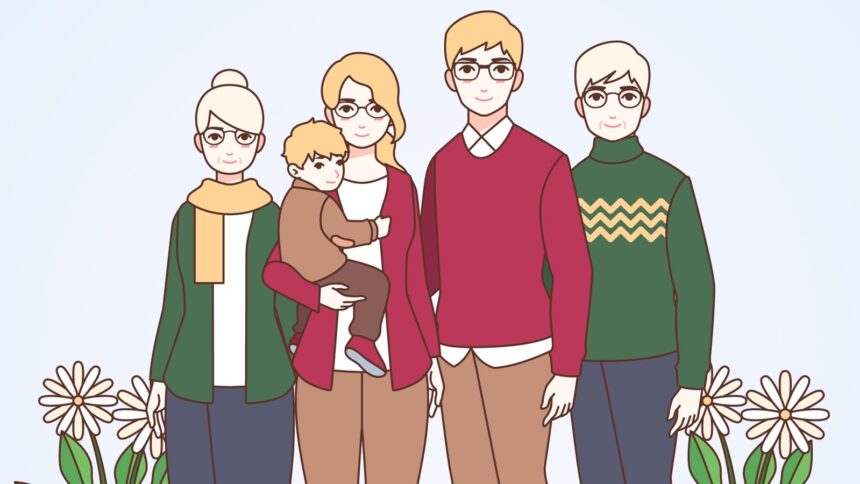A simple street question to men has sparked heated discussions across social media, garnering millions of views and thousands of impassioned comments. The question is, ‘Who holds the highest priority in your life – mother, wife, or your child?”
What began as casual social media discourse has evolved into a cultural examination of how men navigate their most important relationships. The trend has revealed fascinating patterns across different cultures. While responses vary, many men place their mothers at the top of their priority list, often citing cultural values, gratitude for upbringing, or unbreakable emotional bonds as justification.
The question has opened a window into deeper conversations about family dynamics, especially in traditional societies like India, where multi-generational living and deeply rooted customs shape everyday life. A 2022 report by the Pew Research Center highlights how these norms continue to influence family structures: “Adult sons traditionally live with their parents and provide financial support to the family. Meanwhile, when daughters marry, their families may pay a dowry, an illegal practice that still features in some marriages, and daughters often live with their husband’s parents and fulfill obligations toward their in-laws.”
These cultural foundations help explain the popularity and responses to this trend. In many cases, the intense emotional and social bond between a man and his mother is cultivated from early childhood and reinforced by a patriarchal structure that casts men as primary caregivers for their parents. Wives, on the other hand, are often expected to assimilate into the husband’s family and adapt to its needs.
Psychologist Anjali Gursahaney believes so. In a conversation with , she said, “This isn’t necessarily due to a lack of love for their spouses or children, but because of deeply rooted emotional conditioning. From an early age, boys are raised to view their mothers as their primary emotional anchor.”
While this bond may be deep and meaningful, it is rarely balanced by the emotional skill-building needed to form autonomous relationships with future partners.
Counselling psychologist Athul Raj said, “The first relationship — with the mother — often becomes the most emotionally loaded, and not necessarily the most nourishing. It’s not always about love; sometimes it’s obligation, guilt, enmeshment – emotional roles a son never asked for, but was silently assigned.”
He also pointed out that the arrival of a wife or child can cause internal conflict: “How do I show up for this new bond when I’m still emotionally entangled in the old one? It’s not just about choosing a person — it’s about unlearning a script written long ago, often in silence. And that is hard because Indian families don’t talk about emotional boundaries.”
When we posed this question to men, the answers were surprising. “I love and respect all the relationships in my life differently,” said Nipunh Kothari, a professional from Gurugram. “But if I had to answer honestly, I’d say my wife. Not in comparison, but in continuation. — the values I bring to my marriage. Honouring my wife is part of honouring my mother.”
Siddharth Chowdhury, 36, echoed a similar sentiment, though through difficult choices. “My wife. Without hesitation. I chose her over my family at 19 when they told me to leave her because she wasn’t ‘fair like the other women in our family.’ That moment told me everything about where I came from and where I never wanted to return,” he said.
When asked if he felt conflicted about his decision, he shared, “The conflict existed when I thought it was possible to keep everyone happy. Once I realised that silence in the face of harm is not neutrality but complicity, the conflict dissolved.”
For many Indian men, prioritising their mothers is instinctive — a result of decades of social conditioning.
“The mother-son bond is treated as sacred, sometimes to a fault,” said Sanya Jain, 29. “Some mothers raise their sons like princes, shielding them from responsibilities. They expect the daughter-in-law to ‘complete’ their sons,” she said.
Psychologists call this “emotional enmeshment” — where boundaries between mother and son blur, creating patterns that persist well into adulthood, often making the wife feel emotionally sidelined. Gursahaney explained, “In many Indian households, sons are subtly (or overtly) treated as emotionally and socially superior to daughters, and are often placed at the emotional center of the mother’s world. This fosters a sense of emotional enmeshment, where the son feels both adored and indebted.”
Kavya Agarwal, 23, mentioned an often overlooked dynamic that plays out in families. She said, “We must examine how society trains these men to prioritise their mothers. When a woman marries a man, the man’s emotional attachment to his mother alienates his wife from the family unit, where she feels like she is missing something. In such a case, when her son is born, she substitutes her husband for her son to fill in the emotional void left by him. The son, then, grows up exactly the same way as his father, with an unhealthy connection with his mother. This is not a question of who is at fault but who will break the cycle.”
The viral TikTok question has created space for women to articulate experiences that often remain unspoken. Jain described conversations with her husband about his mother’s involvement: “While he listened and tried to understand, the conversation often ended with—’So you want me to leave my parents and move out?’ That’s not what I was asking for. I was trying to talk about healthy boundaries—about creating space where both partners feel valued and respected.”
The psychological impact of these dynamics can be profound. Raj called it “a silent grief” for women in such marriages. “She ends up carrying the emotional labour of the relationship while he struggles to even name his feelings,” he notes. “It’s not that he doesn’t love her. It’s that he’s torn. Torn between being the dutiful son and the emotionally present partner. And no one ever gave him the permission to choose both,” he said.
“It might sound like a Western idea, but it’s time men started prioritising the families they create over the ones they were born into,” said Jain. “Marriage should be a partnership, not a tug-of-war between two households.”
Agarwal offered another perspective: “Who do you think needs you more? The woman who left everything behind to start a new life with you and your children, who are dependent on you, or your financially independent parents who have been living comfortably for as long as you’ve been alive? It’s about priorities, not about choosing between the two.”
Shivani Shastri, a -based professional, hoped for a cultural shift, “I hope someday we get to a point where a formal ‘Vidaaiii’ ceremony happens for both men and women after marriage. That should give men a closure with their own families and make them realise that they too have entered into another phase of their lives.”
The TikTok trend’s most significant value may be in exposing false dichotomies. As psychologist Gursahaney noted, “It’s not about choosing one person over another—it’s about growing emotionally enough to love each relationship in its rightful place, with respect and responsibility.”
Raj emphasised that true change requires fundamental emotional education: “We need stories—in books, in cinema, in music—that show men healing, failing, loving, showing up imperfectly. We must rewire what we celebrate in boys—not just performance or control, but empathy, listening, emotional courage.”
Chowdhury’s reflection perhaps best captures the necessary evolution. He said, “Now, emotional responsibility means choosing clarity over guilt. With my partner, it means showing up without excuses, creating a life where she never has to negotiate for safety, voice, or space.”




![[WATCH] IPL 2025: Vaibhav Suryavanshi touches MS Dhoni's feet post winning clash vs CSK](https://eflip.in/wp-content/uploads/2025/05/1747763070972_ms-dhoni-and-vaibhav-suryavanshi-150x150.jpeg)



